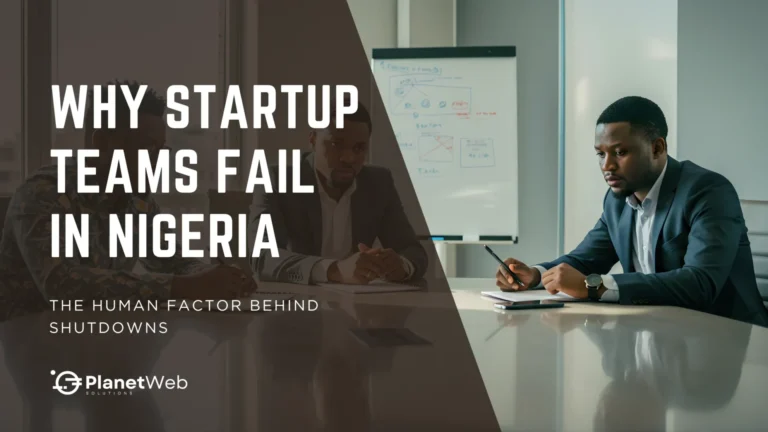🗓️ Last updated: October 2025
Nigerian Startup Ecosystem: What Changed, Who Survived, and What Founders Need to Know
The Nigerian startup ecosystem went through a brutal correction in 2024. Funding dropped over 50% from 2023 levels. High-profile shutdowns accelerated. Inflation hit 34.8%, the naira crossed ₦1,700 to the dollar, and the era of “growth at all costs” ended abruptly.
But by mid-2025, something shifted. Funding started flowing again to startups with real unit economics. Moniepoint achieved unicorn status. Investors returned, but with different priorities: profitability over growth, sustainability over scale, proven revenue models over ambitious projections.
This isn’t the ecosystem of 2021-2022. It’s leaner, more skeptical, and more focused on fundamentals. If you’re building in Nigeria now or considering it, you need to understand what actually happened, who’s getting funded and why, which sectors are working, and what mistakes keep killing startups despite founders knowing better.
This guide breaks down the current state of Nigeria’s startup ecosystem with specific data, real failure analysis, investor perspectives, and practical frameworks for navigating funding, sector selection, and strategic positioning. Whether you’re raising capital, pivoting your model, or just trying to survive, these insights matter.
Related reading: Why Startups Fail in Nigeria explores the deeper failure patterns, while Nigerian Startups Going Global shows how survivors are scaling internationally.
Note: This is a comprehensive guide to the Nigerian startup ecosystem covering funding trends, failure analysis, sector opportunities, regional dynamics, policy updates, and strategic guidance for founders. We update this regularly to keep it fresh and relevant as the ecosystem evolves.
The 2024 Funding Crash and 2025 Recovery
What Actually Happened
The first half of 2024 was the worst funding period for Nigerian startups since 2020. Only $589 million was raised across 114 equity and debt deals, down from $1.2 billion in 2023. That’s not a slowdown. That’s a collapse.
Investors stopped writing checks because too many 2021-2022 investments were failing. Companies that raised at inflated valuations couldn’t hit growth targets. Unit economics that “would fix themselves at scale” never fixed themselves. Burn rates stayed high while revenue growth stalled or reversed.
The funding winter forced immediate consequences. Startups with less than 12 months of runway and no clear path to profitability started shutting down. Others laid off 30-50% of staff. Some pivoted desperately to find product-market fit they should have validated before scaling.
By the second half of 2024, funding recovered somewhat. Africa raised over $1.4 billion total, with Nigeria capturing 18% of continental VC. But this wasn’t a return to 2022 conditions. The money came with stricter terms, lower valuations, and intense scrutiny on unit economics.
Who Got Funded in 2024-2025
Mega rounds dominated: Moniepoint ($110M), Moove ($100M+), Sun King Nigeria (climate-focused). These weren’t early-stage bets on potential. They were growth-stage investments in companies with proven revenue, positive unit economics, and clear paths to profitability.
Early-stage funding remained tight. Pre-seed and seed rounds under $2 million became extremely competitive. Investors wanted proof of concept before writing checks, reversing the 2021 playbook of funding ideas and teams without validated traction.
The funding that flowed went to specific sectors and business characteristics:
- B2B over B2C because businesses have a more predictable cash flow and a higher willingness to pay
- Transaction-based revenue over subscriptions because it aligns with customer success and Nigerian payment realities
- Profitable or near-profitable over high-burn growth stories
- Proven founders with previous exits or successful track records over first-time founders
This connects directly to revenue model selection. The models getting funded are those that work in Nigeria’s actual economic conditions, not theoretical Silicon Valley playbooks.
What This Means for Founders in Late 2025
If you’re fundraising now, expect:
- 6-12 month processes from first contact to cash in the bank
- Lower valuations than comparable 2022 rounds (often 40-60% lower)
- More investor protections in term sheets (liquidation preferences, anti-dilution, board seats)
- Intense due diligence on unit economics, customer retention, and cash flow
- Smaller check sizes with more milestone-based tranches
Bootstrapping for a longer period is viable if your business model supports it. The companies surviving 2025 are those that either raised capital with a 12+ month runway or built sustainable revenue early enough to not depend on funding.
For practical guidance on extending the runway, see Startup Burn Rate in Nigeria.
The Shutdowns: Why These Specific Companies Failed
Beyond the funding numbers, 2024-2025 saw a wave of shutdowns that revealed clear patterns. These weren’t just unlucky failures. They were predictable outcomes of fundamental problems the ecosystem had been ignoring.
Major 2024-2025 Shutdowns and Root Causes
Okra ($16.5M raised) – Open banking API platform. Failed because API pricing was too low to generate meaningful revenue while customer acquisition costs stayed high. They raised significant capital but couldn’t convert it into a sustainable business before the runway expired. The lesson: B2B API businesses need pricing that supports the sales cycle length and support costs.
Edukoya ($3.5M raised) – Edtech platform. Engaged 80,000 students but couldn’t convert engagement into revenue that covered infrastructure costs and content creation at Nigerian price points. They returned money to investors honorably, but the core problem was unit economics that never worked. The lesson: user love doesn’t equal sustainable business if users can’t or won’t pay enough.
Thepeer – Fintech API for wallet interoperability. Struggled with regulatory uncertainty around embedded finance and couldn’t achieve the integration velocity needed to justify continued operations. The lesson: regulatory-dependent businesses need strong relationships with regulators and buffer capital for policy shifts.
Quizac – Gamified learning platform. Built engagement, but the freemium model never converted users. Free alternatives existed, premium features weren’t compelling enough to overcome payment friction, and infrastructure costs for free users burned through capital. The lesson: freemium in Nigeria requires exceptional conversion mechanics or unsustainable losses.
Chopnownow ($200K+ burned) – Food delivery. Cost per delivery exceeded revenue per order. Scale amplified losses instead of fixing margins. Logistics costs in Nigeria (fuel, traffic, addressing challenges) made food delivery economics brutal without premium pricing that customers wouldn’t pay. The lesson: if unit economics are negative, volume accelerates death.
BuyCoins Pro – Crypto exchange. Regulatory environment shifted with SEC’s stricter VASP requirements (₦75M licensing fee, enhanced KYC/AML). Couldn’t adapt fast enough or justify compliance costs against trading volumes. The lesson: build compliance into the model from day one, especially in regulated sectors.
HerRyde – Women-focused mobility. Couldn’t achieve the scale needed to make ride-hailing economics work in a market where Uber and Bolt already operate with massive advantages. The lesson: competing directly with well-funded incumbents requires significant differentiation or capital reserves.
Common Failure Patterns
Across these shutdowns, several patterns emerge:
Unit economics are ignored until it is too late. Most founders knew their costs exceeded revenue but assumed scale would fix it. Scale rarely fixed anything. It just amplified the core problem.
Freemium doesn’t work without conversion. Multiple edtech and fintech companies discovered that Nigerian users love free products but won’t convert to paid at rates needed for sustainability.
Regulatory risk is underestimated. Fintech shutdowns particularly show that regulatory changes can kill businesses overnight if compliance isn’t built into the foundation.
B2C models struggle. Most shutdowns were consumer-facing businesses fighting low purchasing power, high CAC, payment friction, and intense competition. B2B models showed better survival rates.
Funding is treated as a success metric. Raising capital validated investor interest, but didn’t validate business sustainability. Companies with $3M-$16M raised still failed because raising money isn’t the same as building a sustainable business.
For a comprehensive analysis of failure patterns, see Failed Nigerian Startups: Why They Collapsed.
Who’s Thriving: Success Patterns in 2024-2025
While shutdowns dominated headlines, several companies not only survived but thrived by building for Nigerian realities rather than Silicon Valley assumptions.
Moniepoint hit unicorn status ($1B+ valuation) with $110M raised in late 2024. Their success came from transaction-based revenue (pay-per-use), agent banking that works with infrastructure constraints, and unit economics that were profitable before they scaled. They processed over $150 billion in transactions in 2023 and now handle over 800 million monthly transactions worth over $17 billion.
Chowdeck made food delivery work by charging prices that actually cover logistics costs in specific service areas. Instead of subsidizing delivery to gain market share, they built sustainable economics first, then scaled only where margins held.
Flutterwave and Paystack continued growing by building on transaction fees that align perfectly with customer success. Their revenue scales naturally as customer payment volumes increase, creating genuine alignment rather than the misalignment common in subscription models.
Sun King Nigeria attracted significant climate investment by addressing energy poverty with pay-as-you-go solar solutions. Their model works because it solves a painful problem (unreliable power) with an affordable pricing structure (small daily payments instead of large upfront costs).
Zone raised $8.5M for blockchain-powered instant interbank transfers. They’re solving real payment friction (multi-day bank transfers) with measurable improvement (instant settlement), and their transaction-based pricing aligns with value delivered.
What Winners Share
Companies succeeding in Nigeria’s current ecosystem have common characteristics:
Revenue models that work here. Pay-per-use and transaction fees dominate because they reduce commitment barriers and align with irregular income patterns. Subscriptions work mainly in B2B, where cash flow is stable.
Positive unit economics before scale. Winners proved profitability per customer/transaction at a small scale, then scaled what worked. Losers scaled, hoping volume would fix broken economics.
Infrastructure resilience. Successful companies designed for Nigeria’s actual infrastructure: unreliable power, slow internet, intermittent connectivity, and low-end devices. Failures assumed Western infrastructure.
Clear value proposition. Winners solve urgent, painful problems with measurable improvement. Losers built nice-to-have features or solved problems that weren’t urgent enough to drive adoption.
Efficient capital usage. Thriving companies have low burn rates relative to revenue, which extends their runway and gives them time to iterate without desperation.
Sector Analysis: What’s Working and What’s Dying
Fintech: Still Dominant but Saturated
Fintech captured over 40% of 2024 funding and remains Nigeria’s strongest sector. But not all fintech is equal.
What’s working:
- B2B payment infrastructure (Flutterwave, Paystack, Zone)
- Agent banking and POS networks (Moniepoint)
- Cross-border payments and remittances
- Embedded finance for platforms
- Compliance and regtech
What’s struggling:
- Consumer lending at scale (high default rates, expensive acquisition)
- Crypto exchanges (regulatory uncertainty, compliance costs)
- Neobanks without clear differentiation
- Wallet-to-wallet services (fragmentation problem less urgent than assumed)
The fintech space is crowded. New entrants need extremely clear differentiation or exceptional execution to compete with well-funded incumbents.
Cleantech: Rising Fast
Solar energy, power solutions, and climate tech saw significant investment growth in 2024-2025. Nigeria’s energy crisis creates urgent demand, and falling solar hardware prices make solutions increasingly affordable.
What’s working:
- Pay-as-you-go solar (Sun King, Beacon Power, PAS Solar)
- Commercial solar for SMEs escaping diesel costs
- Energy management and monitoring systems
- Off-grid solutions for rural areas
Business model reality: Cleantech works because it solves immediate pain (unreliable power, high diesel costs) with measurable ROI. Companies charging ₦500-1,000 daily for solar access are more sustainable than those requiring ₦200,000 upfront.
Edtech: Struggling for Sustainability
Despite high engagement, edtech faces brutal economics. Parents and students have low willingness to pay, infrastructure gaps limit digital learning, and free alternatives (YouTube, government schools) create constant competition.
What’s working:
- Corporate upskilling and B2B training
- Exam preparation with urgent deadlines (uLesson’s strongest segment)
- Skills training with job placement (outcomes-based pricing)
What’s failing:
- Consumer edtech with freemium models (Quizac, Edukoya struggled here)
- Subscription learning platforms
- K-12 digital content without school partnerships
The pivot from B2C to B2B (like Kippa’s move to Kippa Learn for workforce training) shows where sustainable revenue exists.
Healthtech: Early but Promising
Healthtech remains underfunded relative to market need but shows promise where models fit Nigerian realities.
What’s working:
- Telemedicine with affordable consultation pricing
- Supply chain and pharma logistics (DrugStoc, Field)
- Diagnostic screening using AI (FundusAI)
- B2B hospital management software
Business model reality: Out-of-pocket healthcare spending in Nigeria is high, but price sensitivity is extreme. Successful healthtech charges ₦1,000-3,000 for consultations, not ₦10,000. Volume matters more than premium pricing.
AI and Deep Tech: Overhyped but Emerging
The ₦100M Nigeria AI Fund supported ten early-stage companies in 2024, including FundusAI and Rana Energy. Google provided ₦2.8B to Data Science Nigeria for capacity building.
Reality check: Most “AI startups” are using basic ML or APIs from OpenAI/Google. True deep tech (custom models, novel algorithms, breakthrough research) is rare and requires capital intensity that Nigeria’s ecosystem struggles to support.
What might work:
- AI for customer support automation
- Computer vision for diagnostics
- Agricultural analytics and optimization
- Fraud detection for financial services
The key: AI must solve specific problems better/cheaper than existing solutions, not just add “AI-powered” to a product description.
Regional Reality: Lagos vs. Everyone Else
Lagos dominates with 70% of startups and ecosystem value near $9 billion. But building outside Lagos has unique challenges and some advantages.
Lagos advantages:
- Dense investor presence
- Larger talent pool
- Better infrastructure (relatively)
- More vendor options for services
- Network effects and ecosystem support
Lagos disadvantages:
- Higher costs (office, salaries, living)
- More competition for talent and attention
- Overcrowding and traffic affecting operations
Other cities gaining traction:
Enugu launched $10M Startup Seed Fund, built digital smart schools, targeting 300,000 tech-skilled youths by 2031. Governor Mbah’s administration prioritizes innovation.
Benin City opened Nigeria’s first state-owned data center, deployed Edo Innovation Hub, and partnered with GOMYCODE for tech training. Governor Obaseki’s legacy of tech investment.
Abuja hosts government regulators and growing govtech/climate tech startups, though funding remains limited.
Port Harcourt, Ibadan, and Kano have nascent ecosystems but lack significant VC presence.
Building outside Lagos:
- Lower operating costs can extend the runway significantly
- Less competition for local talent
- State government support can be more accessible
- But funding requires Lagos/international connections
- Vendor and service options are more limited
- Infrastructure more challenging
Many startups start outside Lagos to build cheaply, then open a Lagos presence when raising capital or scaling.
Policy and Regulation: Progress and Persistent Problems
What’s Improving
Nigeria Startup Portal registered nearly 13,000 startups by late 2024. This provides legal recognition and access to Startup Act benefits, though actual benefit realization remains uneven.
SEC-approved crypto licensing firms like Busha and Quidax enable clearer operations and banking partnerships for compliant operators.
The Lagos Innovation Bill was passed to streamline funding access and strengthen IP protection, though implementation is early.
Tax incentives under the Startup Act exist on paper: a 3-year tax holiday for qualified startups, capital gains exemptions on startup investments, and VAT exemptions on certain tech services.
What Remains Broken
State-level adoption is patchy. Only 8-10 states have meaningfully domesticated the Startup Act. Most states lack implementation frameworks, dedicated innovation agencies, or actual funding allocated to startup support.
Regulatory uncertainty persists. CBN policies on electronic transfer levies, capital controls, and fintech licensing continue shifting. SEC VASP requirements created compliance costs that many crypto startups couldn’t absorb. NDPA data protection enforcement is inconsistent.
Bureaucratic friction remains high. Starting a business officially takes weeks despite digital registration. Banking infrastructure for startups is difficult. FX access for dollar costs is restricted and unpredictable.
Regional inequality. Lagos gets disproportionate attention and resources. Outside major cities, founders face limited government support, unclear regulations, and difficult access to basic services.
Practical reality: Most founders navigate around regulatory challenges rather than through them. This works until it doesn’t, as BuyCoins and Thepeer discovered.
For context on how policy affects the broader economy, see Nigeria Digital Economy: Inside the NDEPS Strategy.
What Founders Should Do Now
If You’re Fundraising
Start at 12+ months runway. Fundraising takes 6-12 months in Nigeria. Start when you have breathing room, not when you’re desperate.
Prove unit economics first. Investors want to see profitable customers/transactions before scaling. Growth without profitable economics is a red flag now, not a feature.
Target realistic valuations. 2022 multiples don’t apply. Expect 40-60% lower valuations for comparable metrics. Don’t anchor to old comps.
Prepare for intense diligence. Investors dig deep into customer retention, CAC payback, cash flow, and runway projections. Have clean data.
Consider alternative funding. Grants (NITDA, LASRIC, international programs), revenue-based financing, and debt for hard assets. Non-dilutive capital is valuable.
If You’re Building
Choose sectors with clear revenue. B2B fintech, cleantech with measurable ROI, corporate training, supply chain automation. Avoid consumer edtech, complex marketplace models, or anything requiring massive scale for unit economics. For detailed sector analysis and opportunity evaluation, see Best Startup Ideas in Nigeria: 7 Patterns Behind What’s Actually Working.
Design for Nigerian infrastructure. Offline-first, low-bandwidth, mobile-optimized, works with intermittent power. Don’t assume Western infrastructure.
Validate willingness to pay early. Don’t build for engagement without revenue validation. Pre-sell, test pricing, and prove customers will pay before scaling.
Keep burn rate low. Remote work, affordable tools, minimal office space, lean team. Every month of an extended runway is an option value. See burn rate management strategies.
Build for profitability, not just growth. Revenue matters more than users. Positive unit economics matter more than GMV. Sustainability matters more than scale.
If You’re Pivoting
Identify what’s not working. Bad product-market fit? Wrong revenue model? Poor unit economics? Regulatory barriers? Be honest about the root cause.
Test small before committing. Pivot to a new model/market with limited investment. Validate before full commitment. Kippa tested edtech before completely abandoning fintech.
Consider strategic alternatives. Acqui-hire if the team is valuable. Shut down honorably if the path forward is unclear. Merging with a complementary startup. Returning money to investors if the model is fundamentally broken.
Don’t pivot just to stay alive. Some businesses should die. Pivoting without solving core problems merely prolongs the decline.
Quick Ecosystem Assessment Checklist
✅ Is my sector currently getting funded? Check recent funding announcements in your category
✅ Do I have profitable unit economics now or a clear path within 6 months?
✅ Can I survive 18+ months without raising? If yes, you have options. If no, urgency increases risk.
✅ Is my revenue model transaction-based, subscription B2B, or another proven model?
✅ Have I validated willingness to pay at scale? Not just interest, actual payment behavior.
✅ Am I building for Nigerian infrastructure reality? Or assuming Western conditions?
✅ Do I have Lagos connections even if building elsewhere? For fundraising access.
✅ Is my burn rate under 60% of revenue? A higher ratio indicates unsustainability.
2025-2026 Outlook: What’s Next
Consolidation and M&A
Expect increased merger activity as strong startups acquire struggling competitors for technology, talent, or user base. Consolidation is rational when capital is scarce and the proving ground has room for fewer players.
Profitability Focus
The “default alive” mentality replaces “grow at all costs.” Investors prefer companies approaching profitability over high-burn growth stories. This shifts founder incentives from GMV to margins.
B2B Dominance Continues
Business customers have money, a stable cash flow, and a willingness to pay for tools that improve operations. Consumer startups will struggle unless they address urgent needs with a clear ROI.
Climate Tech Growth
Energy crisis, global climate pressure, and improved solar economics make this sector increasingly attractive. Expect more funding and more players.
Regulatory Maturity (Slowly)
More states will domesticate the Startup Act. Regulatory clarity will improve incrementally. But don’t bet your business on fast policy change.
Valuation Realism
2022 valuations are gone. Expect multiples based on revenue, profitability, and path to sustainability rather than user growth and addressable market size alone.
Regional Expansion
Startups proving models in Nigeria will expand to Ghana, Kenya, and South Africa. International expansion becomes a growth strategy for companies that have maxed out the domestic market.
Frequently Asked Questions
Final Thoughts: Build for Reality, Not Hype
The Nigerian startup ecosystem in late 2025 rewards founders who build for Nigerian realities rather than imported Silicon Valley playbooks. The companies that survive and thrive are those with revenue models that work here, unit economics that are positive before scale, and realistic expectations about infrastructure, regulation, and market conditions.
The funding winter of 2024 was a correction, not a collapse. It forced the ecosystem to mature, prioritizing sustainability over hype, profitability over growth, and real value creation over vanity metrics.
If you’re building in Nigeria, focus on solving urgent problems with measurable value, charge prices that support your costs, design for infrastructure reality, and extend runway through capital efficiency. The opportunities remain massive. The path is just more honest now.
For related guidance on building sustainable startups, see Why Startups Fail in Nigeria, Startup Burn Rate Management, and Digital Business Models in Nigeria.
Related Reading
- Best Startup Ideas in Nigeria: 7 Patterns Behind What’s Actually Working
- Why Startups Fail in Nigeria: What the Survivors Do Differently
- Failed Nigerian Startups: Why They Collapsed & Lessons for Future Entrepreneurs
- Nigerian Startups Going Global: How Local Founders Are Scaling Internationally
- Digital Business Models in Nigeria: What Works, What Fails, and How to Choose
Stay Informed on Nigeria’s Startup Ecosystem
At PlanetWeb, we provide practical analysis and real market insights to help Nigerian founders make better strategic decisions.
✔ Share this guide with founders navigating the ecosystem
✔ Subscribe to our newsletter for ecosystem updates and analysis
✔ Follow us on LinkedIn or X
What’s your biggest challenge in Nigeria’s startup ecosystem? Share in the comments.






